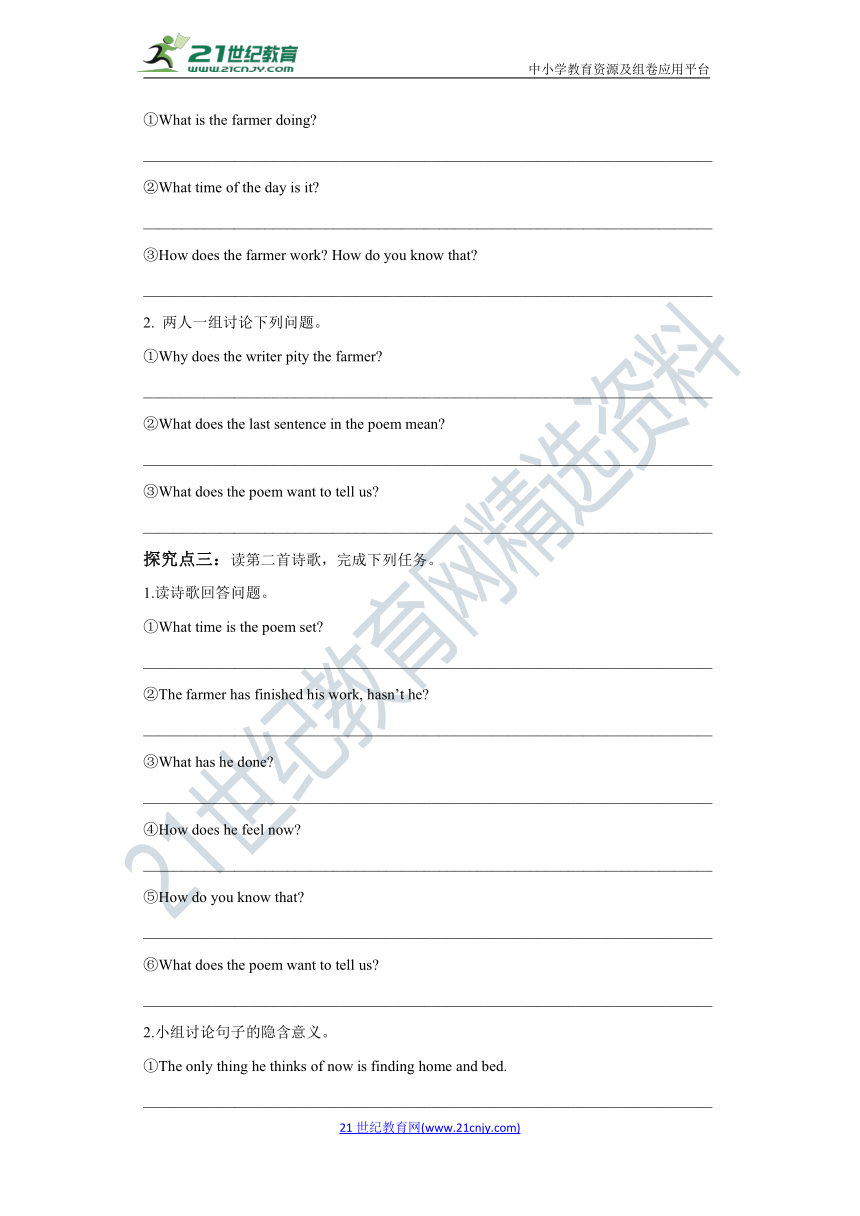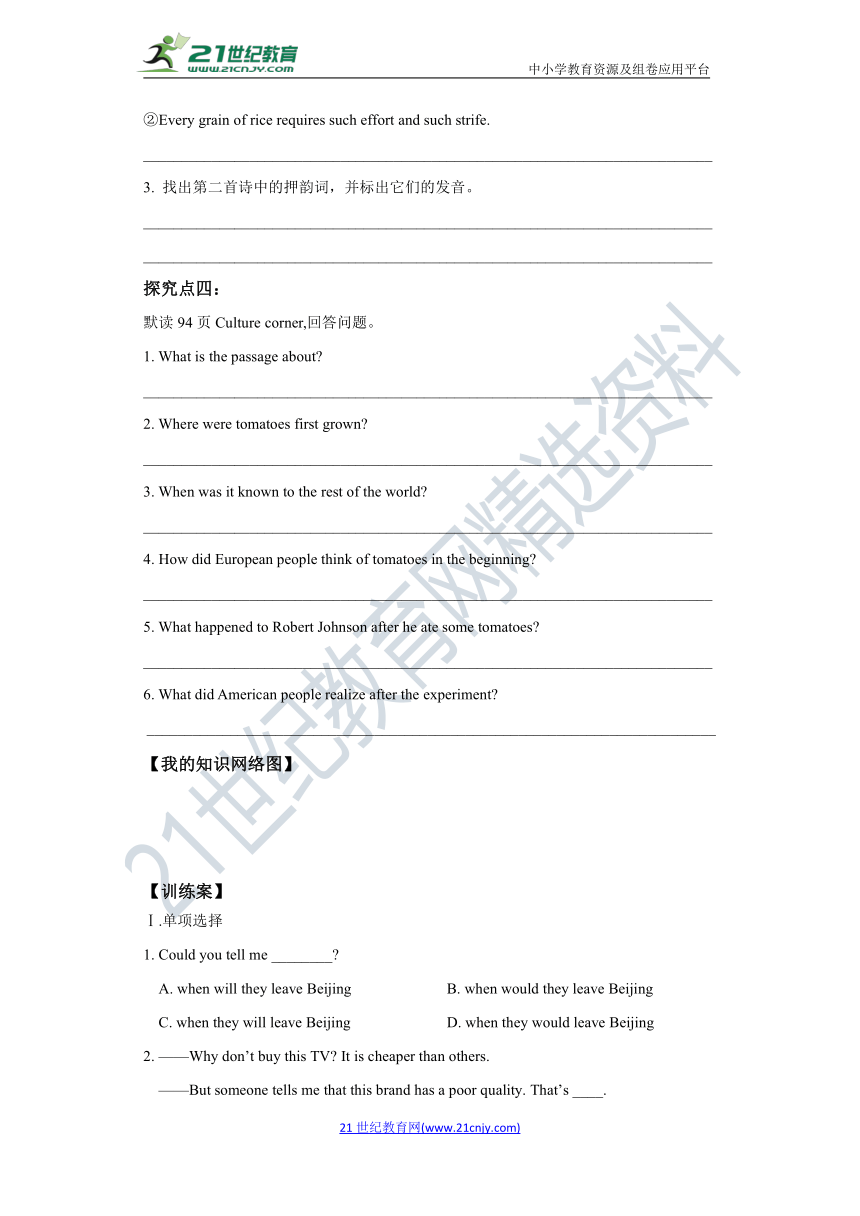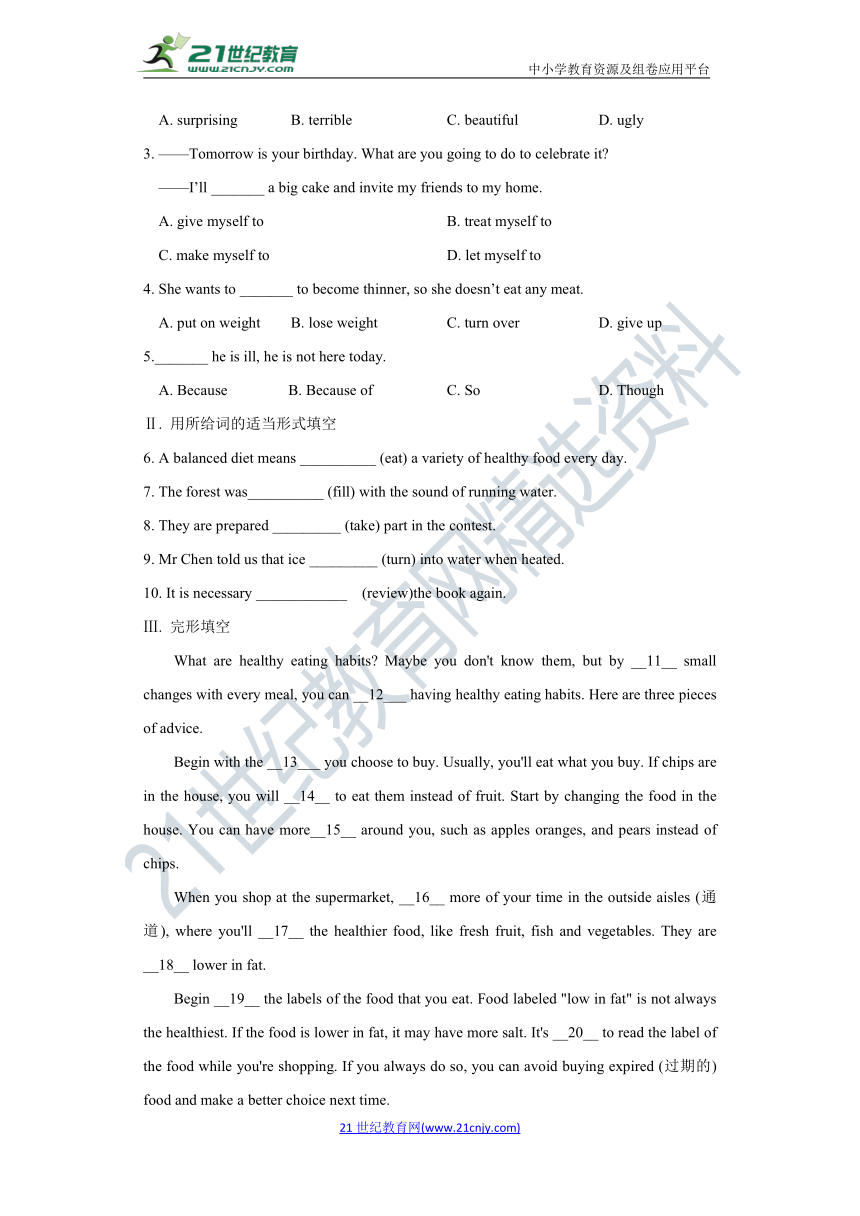Unit 6 Healthy diet 第4课时More practice and culture corner导学案
文档属性
| 名称 | Unit 6 Healthy diet 第4课时More practice and culture corner导学案 |

|
|
| 格式 | doc | ||
| 文件大小 | 1.6MB | ||
| 资源类型 | 试卷 | ||
| 版本资源 | 牛津深圳版 | ||
| 科目 | 英语 | ||
| 更新时间 | 2020-10-15 00:00:00 | ||
图片预览




文档简介
中小学教育资源及组卷应用平台
Module3 Unit 6 Healthy diet
More practice and Culture corner导学案
学生姓名
班级
序号
课题内容 Unit 6 Healthy diet More practice and Culture corner
学习目标 与
核心素养 1.能读懂诗歌,理解诗歌的主题,体会诗歌的意境。
2.能通过比较,发现相同的主题诗歌的异同。
3.明白粮食的来之不易,珍惜粮食,尊重农民的劳动成果。
4.了解一些食物的历史以及趣事。
学习重点 能读懂诗歌,理解诗歌的主题,体会诗歌的意境。
学习难点 能通过比较,发现相同的主题诗歌的异同。
【预习案】
上网查阅资料,了解一些食物的历史以及趣事,并简单写在下面横线上。
____________________________________________________________________________________________________________________________________________________________________________________________________________________________________________________________________________________________________________
2. 默读93页诗歌,完成练习A,B.
【列出我的疑惑】
【探究案】
探究点一:头脑风暴
思考创作诗歌的目的,并将其写在下面横线上。
_________________________________________________________________________________________________________________________________________________________________________________________________________________________________
探究点二:读第一首诗歌,完成下列任务。
1.读诗歌回答问题。
①What is the farmer doing?
___________________________________________________________________________
②What time of the day is it?
___________________________________________________________________________
③How does the farmer work? How do you know that?
___________________________________________________________________________
两人一组讨论下列问题。
①Why does the writer pity the farmer?
___________________________________________________________________________
②What does the last sentence in the poem mean?
___________________________________________________________________________
③What does the poem want to tell us?
___________________________________________________________________________
探究点三:读第二首诗歌,完成下列任务。
1.读诗歌回答问题。
①What time is the poem set?
___________________________________________________________________________
②The farmer has finished his work, hasn’t he?
___________________________________________________________________________
③What has he done?
___________________________________________________________________________
④How does he feel now?
___________________________________________________________________________
⑤How do you know that?
___________________________________________________________________________
⑥What does the poem want to tell us?
___________________________________________________________________________
2.小组讨论句子的隐含意义。
①The only thing he thinks of now is finding home and bed.
___________________________________________________________________________
②Every grain of rice requires such effort and such strife.
___________________________________________________________________________
找出第二首诗中的押韵词,并标出它们的发音。
___________________________________________________________________________
___________________________________________________________________________
探究点四:
默读94页Culture corner,回答问题。
1. What is the passage about?
___________________________________________________________________________
2. Where were tomatoes first grown?
___________________________________________________________________________
3. When was it known to the rest of the world?
___________________________________________________________________________
4. How did European people think of tomatoes in the beginning?
___________________________________________________________________________
5. What happened to Robert Johnson after he ate some tomatoes?
___________________________________________________________________________
6. What did American people realize after the experiment?
?___________________________________________________________________________
【我的知识网络图】
【训练案】
Ⅰ.单项选择
1. Could you tell me ________?
A. when will they leave Beijing B. when would they leave Beijing
C. when they will leave Beijing D. when they would leave Beijing
2. 棗Why don抰 buy this TV? It is cheaper than others.
棗But someone tells me that this brand has a poor quality. That抯 ____.
A. surprising B. terrible C. beautiful D. ugly
3. 棗Tomorrow is your birthday. What are you going to do to celebrate it?
棗I抣l _______ a big cake and invite my friends to my home.
A. give myself to B. treat myself to
C. make myself to D. let myself to
4. She wants to _______ to become thinner, so she doesn抰 eat any meat.
A. put on weight B. lose weight C. turn over D. give up
5._______ he is ill, he is not here today.
A. Because B. Because of C. So D. Though
Ⅱ. 用所给词的适当形式填空
6. A balanced diet means __________ (eat) a variety of healthy food every day.
7. The forest was__________ (fill) with the sound of running water.
8. They are prepared _________ (take) part in the contest.
9. Mr Chen told us that ice _________ (turn) into water when heated.
10. It is necessary ____________ (review)the book again.
Ⅲ. 完形填空
What are healthy eating habits? Maybe you don't know them, but by __11__ small changes with every meal, you can __12___ having healthy eating habits. Here are three pieces of advice.
Begin with the __13___ you choose to buy. Usually, you'll eat what you buy. If chips are in the house, you will __14__ to eat them instead of fruit. Start by changing the food in the house. You can have more__15__ around you, such as apples oranges, and pears instead of chips.
When you shop at the supermarket, __16__ more of your time in the outside aisles (通道), where you'll __17__ the healthier food, like fresh fruit, fish and vegetables. They are __18__ lower in fat.
Begin __19__ the labels of the food that you eat. Food labeled "low in fat" is not always the healthiest. If the food is lower in fat, it may have more salt. It's __20__ to read the label of the food while you're shopping. If you always do so, you can avoid buying expired (过期的) food and make a better choice next time.
11. A. meeting B. persuading C. making D. hiring
12. A. start B. mind C. select D. suggest
13. A. grain B. food C. vegetable D. candy
14. A. seem B. hate C. refuse D. prefer
15. A. fruits B. meat C. vegetables D. grains
16. A. cost B. take C. spend D. pay
17. A. deliver B. recognize C. lose D. find
18. A. traditionally B. quickly C. firstly D. easily
19. A. reading B. writing C. listening D. speaking
20. A. bad B. necessary C. unhelpful D. difficult
Ⅳ.阅读理解
(2020百色)All around the world, people drink tea. But tea does not mean the same thing to everyone. In different countries people have different ideas about drinking tea.
In China, for example, tea is always served when people get together. The Chinese drink it at any time of the day at home or in tea houses. They prefer their tea without putting any other thing in it.
Tea is also important in Japan. The Japanese have a special way of serving tea called a tea ceremony. It is very old and full of meanings. Everything must be done in a special way in the ceremony. There is even a special room for it in Japanese homes.
Another tea-drinking country is England. In England, the late afternoon is "tea time". Almost everyone has a cup of tea then. The English usually make tea in a teapot and drink it with cream and sugar. They also eat cakes or cookies at tea time.
In the USA, people drink tea mostly for breakfast or after meals. Americans usually use tea bags to make their tea. Tea bags are faster and easier than making tea in teapots. In summer, many Americans drink cold tea, "Ice Tea". Sometimes they drink iced tea from cans(易拉罐).
21. Tea is popular __________.
A. all over the world B. only in the USA
C. only in English-speaking countries D. only in Asian countries
22. The Chinese drink tea__________.
A. in a special ceremony B. with cakes or cookies
C. when they get together D. from cans in tea houses
23. The English like to __________.
A. drink tea without anything in it
B. drink tea with cream and sugar
C. drink tea for breakfast
D. drink tea in a special room
24. "Ice Tea" is popular ____________.
A. in winter B. in England
C. in late afternoons D. in the USA
25. The passage is about____________.
A. Chinese tea
B. the importance of tea
C. the tea time in England
D. different ways of drinking tea in different countries
【教与学的反思】
预习案答案:
2.
探究案答案:
探究点一:
探究点二:
1.
2.
探究点三
1.
2.
3.
训练案答案:
Ⅰ. 1-5:CBBBA
Ⅱ. 6. eating 7. filled 8. to take 9. turns 10. to review
Ⅲ. 11-15 CABDA 16-20 CDAAB
Ⅳ. 21-24 ACBDD
_21?????????è?????(www.21cnjy.com)_
Module3 Unit 6 Healthy diet
More practice and Culture corner导学案
学生姓名
班级
序号
课题内容 Unit 6 Healthy diet More practice and Culture corner
学习目标 与
核心素养 1.能读懂诗歌,理解诗歌的主题,体会诗歌的意境。
2.能通过比较,发现相同的主题诗歌的异同。
3.明白粮食的来之不易,珍惜粮食,尊重农民的劳动成果。
4.了解一些食物的历史以及趣事。
学习重点 能读懂诗歌,理解诗歌的主题,体会诗歌的意境。
学习难点 能通过比较,发现相同的主题诗歌的异同。
【预习案】
上网查阅资料,了解一些食物的历史以及趣事,并简单写在下面横线上。
____________________________________________________________________________________________________________________________________________________________________________________________________________________________________________________________________________________________________________
2. 默读93页诗歌,完成练习A,B.
【列出我的疑惑】
【探究案】
探究点一:头脑风暴
思考创作诗歌的目的,并将其写在下面横线上。
_________________________________________________________________________________________________________________________________________________________________________________________________________________________________
探究点二:读第一首诗歌,完成下列任务。
1.读诗歌回答问题。
①What is the farmer doing?
___________________________________________________________________________
②What time of the day is it?
___________________________________________________________________________
③How does the farmer work? How do you know that?
___________________________________________________________________________
两人一组讨论下列问题。
①Why does the writer pity the farmer?
___________________________________________________________________________
②What does the last sentence in the poem mean?
___________________________________________________________________________
③What does the poem want to tell us?
___________________________________________________________________________
探究点三:读第二首诗歌,完成下列任务。
1.读诗歌回答问题。
①What time is the poem set?
___________________________________________________________________________
②The farmer has finished his work, hasn’t he?
___________________________________________________________________________
③What has he done?
___________________________________________________________________________
④How does he feel now?
___________________________________________________________________________
⑤How do you know that?
___________________________________________________________________________
⑥What does the poem want to tell us?
___________________________________________________________________________
2.小组讨论句子的隐含意义。
①The only thing he thinks of now is finding home and bed.
___________________________________________________________________________
②Every grain of rice requires such effort and such strife.
___________________________________________________________________________
找出第二首诗中的押韵词,并标出它们的发音。
___________________________________________________________________________
___________________________________________________________________________
探究点四:
默读94页Culture corner,回答问题。
1. What is the passage about?
___________________________________________________________________________
2. Where were tomatoes first grown?
___________________________________________________________________________
3. When was it known to the rest of the world?
___________________________________________________________________________
4. How did European people think of tomatoes in the beginning?
___________________________________________________________________________
5. What happened to Robert Johnson after he ate some tomatoes?
___________________________________________________________________________
6. What did American people realize after the experiment?
?___________________________________________________________________________
【我的知识网络图】
【训练案】
Ⅰ.单项选择
1. Could you tell me ________?
A. when will they leave Beijing B. when would they leave Beijing
C. when they will leave Beijing D. when they would leave Beijing
2. 棗Why don抰 buy this TV? It is cheaper than others.
棗But someone tells me that this brand has a poor quality. That抯 ____.
A. surprising B. terrible C. beautiful D. ugly
3. 棗Tomorrow is your birthday. What are you going to do to celebrate it?
棗I抣l _______ a big cake and invite my friends to my home.
A. give myself to B. treat myself to
C. make myself to D. let myself to
4. She wants to _______ to become thinner, so she doesn抰 eat any meat.
A. put on weight B. lose weight C. turn over D. give up
5._______ he is ill, he is not here today.
A. Because B. Because of C. So D. Though
Ⅱ. 用所给词的适当形式填空
6. A balanced diet means __________ (eat) a variety of healthy food every day.
7. The forest was__________ (fill) with the sound of running water.
8. They are prepared _________ (take) part in the contest.
9. Mr Chen told us that ice _________ (turn) into water when heated.
10. It is necessary ____________ (review)the book again.
Ⅲ. 完形填空
What are healthy eating habits? Maybe you don't know them, but by __11__ small changes with every meal, you can __12___ having healthy eating habits. Here are three pieces of advice.
Begin with the __13___ you choose to buy. Usually, you'll eat what you buy. If chips are in the house, you will __14__ to eat them instead of fruit. Start by changing the food in the house. You can have more__15__ around you, such as apples oranges, and pears instead of chips.
When you shop at the supermarket, __16__ more of your time in the outside aisles (通道), where you'll __17__ the healthier food, like fresh fruit, fish and vegetables. They are __18__ lower in fat.
Begin __19__ the labels of the food that you eat. Food labeled "low in fat" is not always the healthiest. If the food is lower in fat, it may have more salt. It's __20__ to read the label of the food while you're shopping. If you always do so, you can avoid buying expired (过期的) food and make a better choice next time.
11. A. meeting B. persuading C. making D. hiring
12. A. start B. mind C. select D. suggest
13. A. grain B. food C. vegetable D. candy
14. A. seem B. hate C. refuse D. prefer
15. A. fruits B. meat C. vegetables D. grains
16. A. cost B. take C. spend D. pay
17. A. deliver B. recognize C. lose D. find
18. A. traditionally B. quickly C. firstly D. easily
19. A. reading B. writing C. listening D. speaking
20. A. bad B. necessary C. unhelpful D. difficult
Ⅳ.阅读理解
(2020百色)All around the world, people drink tea. But tea does not mean the same thing to everyone. In different countries people have different ideas about drinking tea.
In China, for example, tea is always served when people get together. The Chinese drink it at any time of the day at home or in tea houses. They prefer their tea without putting any other thing in it.
Tea is also important in Japan. The Japanese have a special way of serving tea called a tea ceremony. It is very old and full of meanings. Everything must be done in a special way in the ceremony. There is even a special room for it in Japanese homes.
Another tea-drinking country is England. In England, the late afternoon is "tea time". Almost everyone has a cup of tea then. The English usually make tea in a teapot and drink it with cream and sugar. They also eat cakes or cookies at tea time.
In the USA, people drink tea mostly for breakfast or after meals. Americans usually use tea bags to make their tea. Tea bags are faster and easier than making tea in teapots. In summer, many Americans drink cold tea, "Ice Tea". Sometimes they drink iced tea from cans(易拉罐).
21. Tea is popular __________.
A. all over the world B. only in the USA
C. only in English-speaking countries D. only in Asian countries
22. The Chinese drink tea__________.
A. in a special ceremony B. with cakes or cookies
C. when they get together D. from cans in tea houses
23. The English like to __________.
A. drink tea without anything in it
B. drink tea with cream and sugar
C. drink tea for breakfast
D. drink tea in a special room
24. "Ice Tea" is popular ____________.
A. in winter B. in England
C. in late afternoons D. in the USA
25. The passage is about____________.
A. Chinese tea
B. the importance of tea
C. the tea time in England
D. different ways of drinking tea in different countries
【教与学的反思】
预习案答案:
2.
探究案答案:
探究点一:
探究点二:
1.
2.
探究点三
1.
2.
3.
训练案答案:
Ⅰ. 1-5:CBBBA
Ⅱ. 6. eating 7. filled 8. to take 9. turns 10. to review
Ⅲ. 11-15 CABDA 16-20 CDAAB
Ⅳ. 21-24 ACBDD
_21?????????è?????(www.21cnjy.com)_
